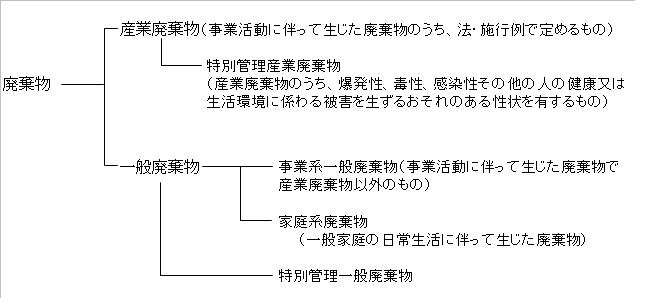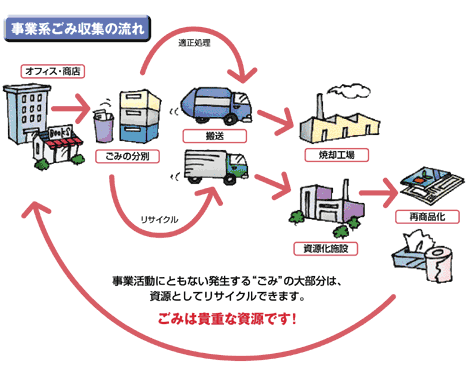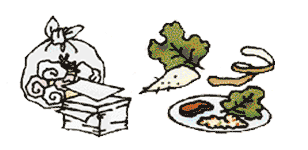- Yokohama-shi Top Page
- Business
- Menu by field
- Waste and recycling
- Business-related general waste
- Business-related general waste
Here's the text.
Business-related general waste
Last Updated November 6, 2024
Waste refers to solids or liquids (excluding radioactive materials and those contaminated by them) that are no longer needed because the occupant cannot use it or sell it to others for a fee. It is classified as general waste and industrial waste.
In Yokohama City, waste generated from family life is regarded as household waste of general waste, and not only for commercial purposes such as stores, companies, factories, offices, etc., but also for public services such as hospitals, schools, and public offices. Waste generated from business activities, including places where services are provided, is called business waste (business waste). Business-related waste is broadly divided into business-related general waste and industrial waste, and garbage other than ![]() industrial waste (PDF: 151KB) is referred to as business-related general waste (general waste).
industrial waste (PDF: 151KB) is referred to as business-related general waste (general waste).

Flow diagram of general waste and industrial waste
Responsibilities of Business Operators
Businesses are responsible for self-processing of waste generated by their business activities in the "Waste Disposal and Public Cleansing Law" and the "Ordinance on Reduction, Recycling and Proper Treatment of Waste in Yokohama City" It is determined as follows.
- Businesses must properly dispose of the waste generated from their business activities at their own risk.
(This business activity is for all business activities and does not matter for profit purposes.) - We must strive to reduce the amount of waste by recycling waste generated from business activities.
- Businesses must actively cooperate with the measures of Yokohama City regarding reduction, recycling and proper disposal of waste.
- Self-processing refers to the proper disposal of waste by the discharge company.
This includes entrusting and processing when it cannot be processed by itself.
In the case of consignment processing, it must be processed according to the processing standards stipulated in the Waste Management Law and city regulations. - Consignment processing refers to outsourcing to a licensed contractor who can process waste.
In that case, the discharge company must entrust according to the consignment standards stipulated in the Waste Management Law and city regulations.
- Recyclables such as recycle paper cannot be provided to local recyclables collection, which is conducted by Neighborhood Association and Neighborhood Associations.
At the same time, collection box for recyclables installed in various parts of the city is not available. Even if it is a small amount, it must be self-processed.
About separation and collection of business-related garbage
Business waste is not collected in Yokohama City.
In addition, resources such as recycle paper cannot be provided to local recyclables collection, which is operated by Neighborhood Association and Neighborhood Associations. At the same time, collection box for recyclables installed in various parts of the city is not available. Even small quantities or recyclables cannot be sent to the household garbage collection point.
Penalties (fines 2,000 yen) will be imposed if you make recommendations and orders to those who do not follow the sorting rules, and if you put out garbage without separating them. (From May 1, 2008) (For details, go to the Hama Rule page to separate them.)
The rules differ from the separation of business waste and the separation of household garbage.
- Regarding the separation of business-related wastePage of "How to separate garbage and resources for business garbage"He
- Regarding recycling methods"Let's promote recycling!" PageHe
- Recycling facilitiesList of recycling facilities pageHe
If it is not possible to recycle it.
For general waste, we will contact a company that has been licensed to collect and transport municipal waste.
For industrial waste, the Company is authorized to collect and transport industrial waste.
Please ask for collection and process it for a fee.
●When storing the separated waste, a storage location will be set up on the premises and stored properly until transportation.
※Take measures to prevent waste from scattering and flowing out, penetrate underground, and emit odors. In addition, about storage of industrial waste, please keep in accordance with ![]() industrial waste storage standard (PDF: 468KB).
industrial waste storage standard (PDF: 468KB).
●Early morning, Mainichi, etc. can be collected, so please consult with a licensed contractor for the time, number of times, collection method, etc.
●At the city's incineration plant, recyclable recycle paper (newspapers, magazines, cardboard, paper packs, OA paper, mixed paper, confidential documents, etc.) cannot be disposed of as general waste. (Paper garbage, such as disposable chopsticks bags and envelopes, cannot be placed in general garbage. In addition, cardboard cannot be used as garbage containers) Separate by type (cardboard is folded and paper packs are removed) and handed over to a recycle paper dealer for recycling.
●When disposing of kitchen garbage, drain the water thoroughly by squeezing it before discharging it. The amount is reduced and the bad smell can be suppressed.
●In accordance with the Food Recycling Law (outside site), food-related businesses (food manufacturing, restaurants, etc.) are required to reduce or recycle more than 20% of the kitchen garbage (cooking waste, leftover food, etc.).
●Recently, the damage caused by crows at the time of garbage discharge has increased. Properly use garbage containers (with lids) and bird nets, etc., and make sure to take measures to prevent scattering.
●There is also a method of transporting it to an incineration plant in Yokohama by itself. In this case, it is necessary to apply in advance to the Resources and Waste Recycling Bureau Collection Office in the ward where the general waste was generated. Prohibited items that cannot be imported include recycle paper, ![]() industrial waste (PDF: 151KB) (waste plastics, metal waste, glass ceramic waste, wood waste and waste oil related to the construction industry. Including cans, bottles, plastic bottles, etc. Please be careful.
industrial waste (PDF: 151KB) (waste plastics, metal waste, glass ceramic waste, wood waste and waste oil related to the construction industry. Including cans, bottles, plastic bottles, etc. Please be careful.
In addition, if you bring in prohibited items, we will provide guidance (PDF: 242KB) such as take-out by inspection of carry-in items.
●The contract fee of the licensed contractor includes the processing cost (13 yen / kg) for carrying it to factories and disposal sites in Yokohama City.

Figure explaining the flow of business-related waste collection

Image of garbage that is likely to occur in business
This kind of "garbage" is also business-related garbage!
- Tea husks, meals left behind by employees, etc.
- Papers such as slips and documents
- Cooking waste and leftovers from restaurants and employee cafeterias
No matter how small (regardless of the amount or weight of garbage) you need to process for a fee.
Responsibilities of large-scale commercial building owners
What is a large-scale building for business use?
- Large-scale retail stores prescribed in Article 2, Paragraph 2 of the Large-Scale Retail Store Location Act (Act No. 91 of 1998)
- Retail stores with a total floor area of more than 500 m2 and less than 1,000 m2 for retail stores.
- The total floor area of the part to be used for business is 3,000 m2 or more (there is a building stipulated in Article 2, item 1 of the Building Standards Act (Act No. 201 of 1950) Buildings with a total floor area of 3,000 m2 or more of the part to be used for business of each building)
Pages for building owners and designers of large-scale commercial buildings
Page for owners of large-scale buildings for building business
About house annexation business (collection of garbage from small house annexation office, store)
When city collects garbage from small-scale house annexation office, store, report is necessary.
Eligible offices and stores
This office meets all of the following three requirements: There is no charge for handling garbage.
- The office must be located in conjunction with the residence
(Note) This does not apply if there is a store on the first floor in an apartment, etc., and there is a house above the second floor, or if the house and office are separate buildings even on the same site. - Employees must be made up of relatives of living together.
- The daily average of garbage is 5 kilograms for "household garbage / Business Garbage" or 3 kilograms for "Business Garbage".
Notification method
- registration form is in his ward.Collection Office in Resources and Waste Recycling BureauIt is distributed by the Business Waste Management Section.
required documents
- registration form (3 copies)
- A copy of resident certificate with the relationship of all households
Submission address
You may need a separate PDF reader to open a PDF file.
If you do not have it, you can download it free of charge from Adobe.
![]() To download Adobe Acrobat Reader DC
To download Adobe Acrobat Reader DC
Inquiries to this page
Waste Management Division, Resources and Waste Recycling Bureau Business Waste Management Department
Telephone: 045-671-3818
Telephone: 045-671-3818
Fax: 045-663-0125
Email address: sj-jigyokei@city.yokohama.lg.jp
Page ID: 451-133-313







